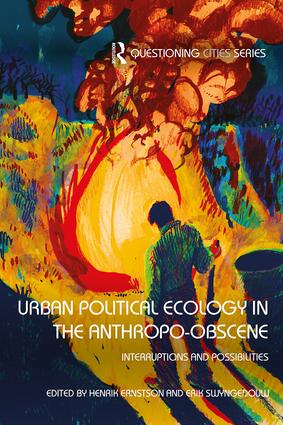How to organize anew the articulation between emancipatory theory and political activism? This is the central organising theme in this edited volume. It represents a major effort and lots of fun by everybody involved. Please read more here about the book. 
Urban Political Ecology in the Anthropo-obscene: Interruptions and Possibilities centres on how to organize anew the articulation between emancipatory theory and political activism.
“What can be done? This book is a must-read for activists, scholars and scholar-activists who struggle for a better and more equal world.” – Giorgos Kallis, ICREA professor, Autonomous University of Barcelona, Spain
“Henrik Ernstson and Erik Swyngedouw have teamed up with colleagues to – once again – push the boundaries of Urban Political Ecology (UPE). They are launching a scathing attack on readings of the Anthropocene that see this new geological era as the ultimate justification for an elitist, techno-managerial politics of unsustainability. This volume is an intellectual firework bringing together radical thinkers who are determined to re-energize the egalitarian emancipatory project.” – Professor Ingolfur Blühdorn, Head of the Institute for Social Change and Sustainability, Department of Socio-Economics, Vienna University of Economic and Business, Austria
“The rise of sustainability science, the traction of ideas about the Anthropocene and the intellectual and practice-based emphasis on complex systems dynamics should not, as Ernstson and Swyngedouw so powerfully remind us in this hard-hitting book, detract from the basic point that the environment is deeply political and as such any intellectual contribution to understanding environmental concerns needs too to be inherently political.” – Professor Sue Parnell, University of Bristol and African Centre for Cities, University of Cape Town, South Africa
Erik and I are teaching from some of its chapters now. And I know that Suraya Scheba at University of Cape Town is doing the same. It has helped to place the discussion in our political ecology classes beyond tracing sociomaterial flows and introduce both different geographies, and political theory. /Henrik


